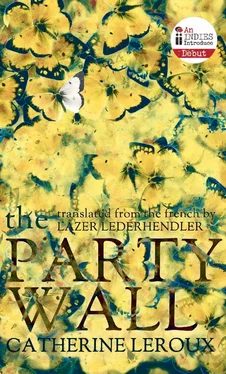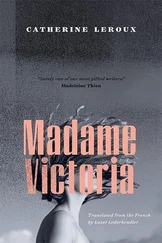Given her parents’ lack of caution, such a blunder might not have been so preposterous were it not for the striking resemblance between them and their offspring. Of course, Madeleine did not see the resemblance. Among members of the same family the common traits are often lost in the sea of differences one tries so hard to underscore, especially when the idea of being the parents’ “spitting image” falls under the heading of an insult or a curse.
The genetic lab’s brochure specifies a waiting period of five business days for the results to be delivered. Five days that Madeleine spends without food or sleep, reeling between the museum and the lighthouse, where she leans her back against the wall at day’s end. One night, she dozes off there and is found after closing hours by the watchman, who insists on seeing her home. She has told him nothing about her worries, but they are old acquaintances and each of them can easily sense the other’s frame of mind.
He takes her back to her garden teeming with mosquitoes, and, lost in her questions, she neglects to thank him. Does her son resemble her? She always saw much more of Micha than of herself in both his physique and demeanour. Hasn’t Édouard inherited his father’s need for space, freedom, and travel? “Except that Micha never travelled, he expatriated himself,” she inwardly replies. But he is detached and withdrawn, just like his father. “His mother is hardly any different,” the inner voice responds again.
“It’s not the same thing,” she retorts crossly, startling Yun — Madeleine had not seen her perched on a tree branch.
“Sorry,” she says to the young woman, who continues to climb toward the top of the beech tree as if hoping to discover coconuts up there.
“That’s okay. I completely agree. Things are never the same.”
When someone is on the road for months at a time it doesn’t take much for him to feel at home. During his years of roving Édouard found shelter in abandoned buses, hollows below train tracks, deserted sheds where three people took turns sleeping on a dilapidated mattress, and he learned to cherish these places with the kind of affection others reserve for the houses where they were born. But nothing could ever match Nora’s cabin.
It was built out of a hodgepodge of plywood sheets and corrugated tin and might have brought to mind a shantytown hovel were it not for its weirdly artistic aspect. In spite of its less-than-modest dimensions, the shack had a dozen windows located at different heights, which overlaid the floor with geometric figures that changed according to the time of day. Nora kept the place clean, and whoever crossed the threshold had to respect the nearly fanatical order that she imposed on her environment.
Markedly older than most of the people who passed through her house, Nora was not altogether old. The criterion on which Édouard — he was twenty-two at the time — based himself in arriving at this conclusion was that he still found her desirable. She never explained where she was from or what had prompted her to build such a remote a dwelling, tucked away a kilometre inside a tract of government land in Oregon. It appears she had gone through a period of wandering before landing there, because she knew the US railroad network by heart as well as the way to cross the Canadian border into Alberta. She always had some advice for her visitors, whom she treated with a blend of kindness and sullen paternalism, but she never dwelled on her own travels. People arrived at her house in the company of one of her regular guests and loaded down with supplies; she would seize the provisions, which she transformed into phenomenal meals seasoned with nameless spices that she identified by their aromas. Sometimes without asking for permission she would confiscate an article of clothing or an object that might help to improve her cabin, and no one dared object to this arbitrary taxation. Life was good at Nora’s place and whatever payment she deemed appropriate was the accepted price.
Édouard spent an entire month at her house. He let his travelling companions continue on without him, as he preferred to be of service to Nora, who needed help to prepare for winter. There were holes in the roof that needed patching, and enough wood had to be gathered for the little rusted stove to maintain a semblance of heat when the frost came scratching at the door. Aware of his amorous feelings, which Édouard was certain he had kept well hidden, Nora consented to share her bed with him and allowed him to nuzzle up against her but without letting the contact go any further. While Édouard detailed the deepest secrets of his young life, Nora listened but never disclosed the least bit of information about herself.
On the first cold day, she filled a bag with edibles and handed him a voucher for a Greyhound bus ticket.
“Go see your mother.”
It hurt Édouard to be turned out of a place where he would have liked to stay forever, but he did his best to hide his disappointment.
“Why? You think she’s worried?”
“You miss her. And you won’t find her here.”
The following summer, Édouard tried to go back to see her. Although he stayed in the area nearly two months, every hour of which would remain etched in his mind, he never managed to find Nora’s cabin again, not even the ruins, not even her footprint on the ground.
The mailman came by almost two hours ago, and Madeleine has been on the verge of opening the letter a dozen times. She inserts the pewter letter opener in the corner of the flap, and just when she is about to slash the envelope open, she freezes. As if she needed a much sharper instrument, a saw or an axe or maybe crab pincers instead of fingers.
Finally, at dusk, she decides on a new strategy. She boils some water and patiently holds the envelope over the jet of steam. It reminds her of Yellowstone Park, where the ground fumes, spews boiling water and sulphurous vapours whose mysteries the tourists come to ponder. That is what Madeleine would need far more than a form containing the numerical sequence of her DNA: a seer whom she could ask to enlighten her. The letters of her name warp on the envelope, which finally opens.
Twenty-three out of forty-six, the sheet announces. In her haste, Madeleine ignores the more discursive explanations; all she manages to read is the little box disclosing the identity of twenty-three out of the forty-six chromosomes that make up Édouard’s DNA. A perfect correspondence. Only a minute later does she decipher the sober but glorious conclusion of the lab technicians who examined the strand of her hair: “You are the child’s biological mother.”
“Édouard!!!”
Madeleine bursts out of the house, body aflame, hand still clutching the letter, calling her son at the top of her lungs. But he is nowhere to be found. She continues running toward the sea and onto the deserted beach, where she strips naked and throws herself into the waves to lose herself in the seaweeds, the iodine, and the fish eggs.
She arrives at Paul’s house at twilight. Frail yet imposing on the crooked veranda, he opens the door holding a table napkin.
“You were eating?”
“Are you hungry?”
Madeleine removes her clothes heavy with seawater and for the second time today stands naked in the open air. Unsurprised, Paul wraps his arms around her, softly lays her down on the worn wooden porch and embraces her, licks the salt, and kneads her skin with his large, scalding hands. His caresses burn right through his lover’s body. Swept up by an uncommonly powerful swell, Madeleine distends, splits in two, divides and multiplies.
When they come ashore, night has fallen. Paul brings a blanket so they can enjoy the spectacle of his vast lands made purple by the star-studded sky. In the distance, animals run without harming themselves, the horses send out their neighs, and some owls flutter their wings in unseen nests. Paul gently strokes Madeleine’s tousled hair.
Читать дальше











